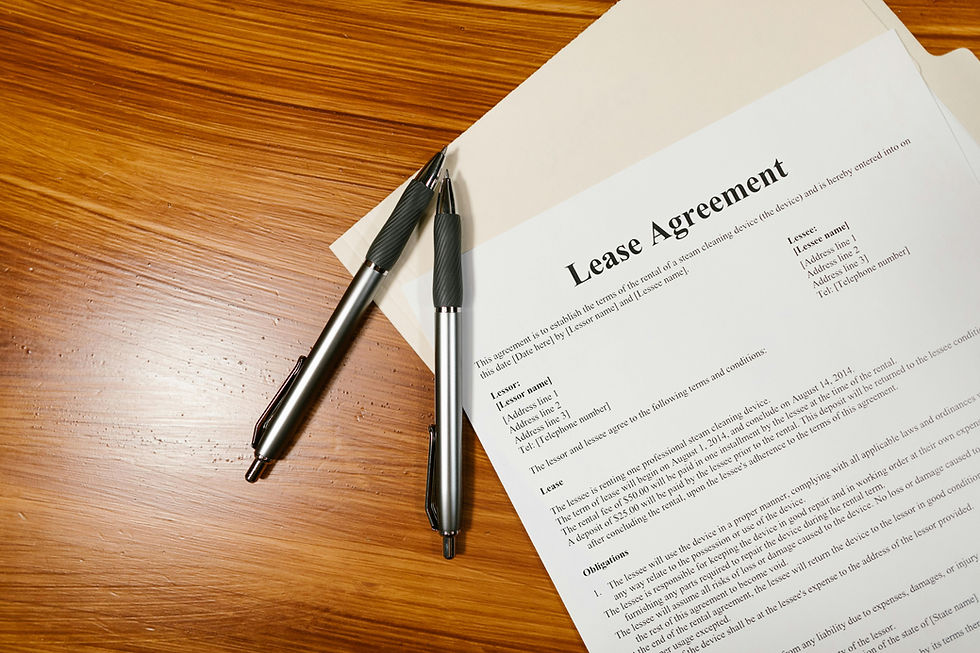Five Critical Lease Clauses Every Tenant Should Negotiate
- eweinblatt3
- Sep 27, 2025
- 3 min read

Signing a commercial lease is one of the most significant financial commitments a business can make. While the rent amount often grabs the most attention, the real story lies in the fine print—the critical lease clauses that determine long-term costs, risks, and flexibility.
According to Ezra Weinblatt, tenants who fail to negotiate these clauses can end up with hidden expenses and limited control over their space. By contrast, those who understand and negotiate effectively protect their bottom line and ensure their lease works in their favor.
Here are five critical lease clauses every tenant should carefully review and negotiate.
1. Rent Escalation Clause
Why It Matters: Most commercial leases include built-in rent increases, often tied to inflation or a fixed annual percentage. Without careful negotiation, tenants may face steep cost hikes over time.
What to Negotiate:
Limit the percentage increase.
Tie increases to an objective measure like CPI (Consumer Price Index).
Ask for caps to avoid runaway rent growth.
Ezra Weinblatt’s Insight: Rent escalation is one of the most critical lease issues. Tenants should aim for predictability and protection against excessive increases, ensuring long-term affordability.
2. Operating Expenses and Common Area Maintenance (CAM) Costs
Why It Matters: Beyond base rent, tenants often share costs for building maintenance, taxes, and insurance. These expenses—known as CAM charges—can be unpredictable and poorly defined.
What to Negotiate:
Demand transparency in what expenses are included.
Exclude certain costs like landlord’s capital improvements.
Request annual audits or caps on increases.
Ezra Weinblatt’s Insight: Uncontrolled CAM charges can quickly erode profitability. This makes it a critical lease clause where tenants must secure clarity and safeguards.
3. Assignment and Sublease Rights
Why It Matters: Businesses evolve. Whether you outgrow your space or need to downsize, having the ability to assign or sublease your lease can save significant financial strain.
What to Negotiate:
Ensure the landlord cannot unreasonably withhold consent.
Push for flexibility in transferring the lease to affiliates.
Define approval timelines to avoid costly delays.
Ezra Weinblatt’s Insight: This is a critical lease clause for protecting future flexibility. Without it, tenants may be locked into a space that no longer meets their needs, while still paying the rent.
4. Repair and Maintenance Responsibilities
Why It Matters: Commercial leases often assign responsibility for repairs, but without clear language, tenants may end up covering major structural costs that should belong to the landlord.
What to Negotiate:
Limit tenant obligations to non-structural repairs.
Ensure landlord covers roof, foundation, and structural elements.
Clarify responsibility for HVAC systems and major equipment.
Ezra Weinblatt’s Insight: Ambiguity in this critical lease clause can result in surprise bills. Tenants should secure written terms that clearly define landlord versus tenant obligations.
5. Renewal and Termination Options
Why It Matters: Leases typically run several years, but tenant needs may change. Having favorable renewal or exit options ensures flexibility and control.
What to Negotiate:
Pre-negotiate renewal terms, including rent.
Secure early termination rights, ideally with defined penalties.
Look for expansion options to grow within the same property.
Ezra Weinblatt’s Insight: The ability to renew or exit gracefully is a critical lease safeguard. Tenants who negotiate these options upfront maintain long-term flexibility and avoid being cornered into poor decisions.
Practical Tips for Tenants
Start Early: Begin negotiations well before the lease start date.
Hire Experts: Work with real estate advisors and attorneys who understand critical lease clauses.
Compare Market Standards: Know what’s typical in your market to strengthen your negotiation position.
Get Everything in Writing: Verbal promises are worthless without being documented in the lease.
Conclusion: Protecting Your Interests Through Critical Lease Negotiations
Commercial leases are more than rent agreements—they’re complex contracts that can make or break a company’s finances. By focusing on critical lease clauses like rent escalation, CAM charges, assignment rights, repair responsibilities, and renewal options, tenants protect themselves from unexpected risks and costs.
As Ezra Weinblatt emphasizes, negotiation isn’t about pushing for everything—it’s about securing fairness and flexibility that align with your business goals. Tenants who approach leasing with knowledge and strategy turn what could be a liability into a long-term asset.


